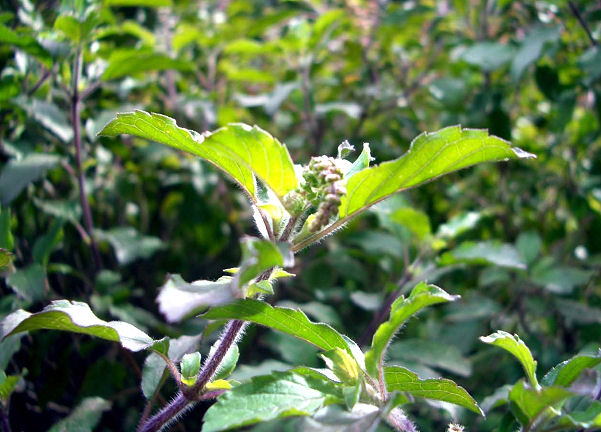- Śrīmatī Vṛndā Devī - - Śrīmatī Tulasī Devī -
Śrī-Tulasī-Stava
(Sṛṣṭi-khaṇḍa of Padma Purāṇa)
TEXT 1
मुनयः सिद्धगन्धर्वाः पाताले नागराट्स्वयम् ।
प्रभावं तव देवेशि गायन्ति सुरसत्तमाः ॥१॥
munayaḥ siddha-gandharvāḥ pātāle nāga-rāṭ svayam
prabhāvaṁ tava deveśi gāyanti sura-sattamāḥ
munayaḥ—sages; siddha-gandharvāḥ—the Siddhas and the Gandharvas; pātale—in the lower region planetary system; nāga-rāṭ—the king of serpents (Ananta-śeṣa); svayam—Himself; prabhāvam—the power; tava—your; deva-īśi—O controller of the demigods; gāyanti—glorify; sura-sattamāḥ—the best of the demigods.
O goddess! The sages, the Siddhas, the Gandharvas, Ananta-śeṣa Himself, the king of serpents who resides in Pātala, and the best of the demigods glorify your power.
TEXT 2
न ते प्रभावं जानन्ति देवताः केशवादृते ।
गुणानां परिमाणं तु कल्पकोटिशतैरपि ॥२॥
na te prabhāvaṁ jānanti devatāḥ keśavādṛte
guṇānāṁ parimāṇaṁ tu kalpa-koṭi-śatair api
na—not; te—they; prabhāvam—power; jānanti—know; devatāḥ—the demidods; keśava-ādṛte—O respected by Keśava; guṇānām—of the qualities; parimāṇam—measuring; tu—but; kalpa-koṭi-śataiḥ—by millions of years; api—even though.
But all these personalities don’t fully understand your power, because it is impossible for the demigods to measure your qualities even in hundreds of millions of years, O you who are favored by Keśava.
TEXT 3
कृष्णानन्दात्समुद्भूता क्षीरोदमथनोद्यमे ।
उत्तमाङ्गे पुरा येन तुलसी विष्णुना धृता ॥३॥
kṛṣṇānandāt samudbhūtā kṣīroda-mathanodyame
uttamāṅge purā yena tulasī viṣṇunā dhṛtā
kṛṣṇa-ānandāt—from the pleasure of Lord Kṛṣṇa; samudbhūtā—one who is generated from; kṣira-uda—the milk ocean; mathana—churning; udyame—in the endeavour; uttama-aṅge—on the head; purā—previously; yena—by whom; tulasī—Tulasī; viṣṇuna—by Lord Viṣṇu; dhṛtā—sustained.
You were generated from the pleasure of Lord Kṛṣṇa during the endeavor of churning the milk ocean, and in ancient times Lord Viṣṇu placed you on his head.
TEXT 4
प्राप्यैतानि त्वया देवि विष्णोरङ्गानि सर्वशः ।
पवित्रता त्वया प्राप्ता तुलसीं त्वां नमाम्यहम् ॥४॥
prāpyaitāni tvayā devi viṣṇor aṅgāni sarvaśaḥ
pavitratā tvayā prāptā tulasīṁ tvāṁ namāmy aham
prapya—obtaining; etāni—these; tvayā—by you; devi—O goddess; viṣṇoḥ—of Lord Viṣṇu; aṇgāni—limbs; sarvaśah—all; pavitratā—purification; tvayā—by you; prāptā—underwent; tulasīm—unto Tulasī; tvām— unto you; namāmi—offer obeisances; aham—I.
O goddess! Having come in contact with the limbs of Viṣṇu you have become pure in all respects. O Tulasī! I offer obeisances unto you.
TEXT 5
त्वदङ्गसम्भवैः पत्रैः पूजयामि यथा हरिम् ।
तथा कुरुष्व मेऽविघ्नं यतो यामि परां गतिम् ॥५॥
tvad-aṅga-sambhavaiḥ patraiḥ pūjayāmi yathā harim
tathā kuruṣva me ’vighnaṁ yato yāmi parāṁ gatim
tvad-aṅga—from your body; sambhavaiḥ—generated; patraiḥ—leaves; pūjayāmi—I worship; yathā—just as; harim—Lord Hari; tathā—thus; kuruṣva—please do; me—in me; avighnam—without obstacles; yataḥ— because of which; yāmi—I attain; param—supreme; gatim—destination.
Just as I worship Lord Hari with the leaves that come from your body, so please make me free from obstacles so that I can attain the supreme destination.
TEXT 6
रोपिता गोमतीतीरे स्वयं कृष्णेन पालिता ।
जगद्धिताय तुलसी गोपीनां हितहेतवे ॥६॥
ropitā gomatī-tīre svayaṁ kṛṣṇena pālitā
jagad-dhitāya tulasī gopīnāṁ hita-hetave
ropitā—planted; gomatī-tīre—on the bank of Gomatī river; svayam—Heimself; kṛṣṇena—by Lord Kṛṣṇa; pālitā—protected; jagat-hitāya—for the sake of the world; tulasī—Tulasī; gopīnām—of the gopīs; hita-hetave —for the benefit.
O Tulasī! Lord Kṛṣṇa planted and protected you on the bank of Gomatī river for the sake of the gopīs and the whole universe.
TEXT 7
rवृन्दावने विचरता सेविता विष्णुना स्वयम् ।
गोकुलस्य विवृद्ध्यर्थं कंसस्य निधनाय च ॥७॥
vṛndāvane vicaratā sevitā viṣṇunā svayam
gokulasya vivṛddhy-arthaṁ kaṁsasya nidhanāya ca
vṛndāvane—in Vṛndānana; vicaratā—by one who is wandering around; sevitā—being worshiped; viṣṇunā— by Lord Viṣṇu; svayam—Himself; gokulasya—of Gokula; vivṛddhi-artham—for the prosperity; kaṁsasya—of Kaṁsa; nidhanāya—for the destruction; ca—and.
Lord Viṣṇu Himself, who wanders around in Vṛndāvana, personally served you for the prosperity of Gokula and the destruction of King Kaṁsa.
TEXT 8
वसिष्ठवचनात्पूर्वं रामेण सरयूतटे ।
राक्षसानां वधार्थाय रोपितात्वं जगत्प्रिये ॥८॥
vasiṣṭha-vacanāt pūrvaṁ rāmeṇa sarayū-taṭe
rakṣasānāṁ vadhārthāya ropitā tvaṁ jagat-priye
vasiṣṭha-vacanāt—following the instruction of Vasiṣṭha; pūrvam—previously; rāmeṇa—by Lord Rāma; sarayū-taṭe—on the bank of the Sarayū river; rakṣasānām—of the demons; vadha-arthāya—for the sake of killing; ropitā—was planted; tvam—you; jagat-priye—O you who are dear to the universe.
O Jagat-priyā! Previously, on the word of the sage Vasiṣṭha, Śrī Rāma planted you on the bank of the Sarayū river for the sake of killing the demons.
TEXT 9
रोपिता तपसो वृद्ध्यै तुलसीं त्वां नमाम्यहम् ।
वियोगे वासुदेवस्य ध्यात्वा त्वां जनकात्मजा ॥९॥
ropitā tapaso vṛdhyai tulasīṁ tvāṁ namāmy aham
viyoge rāghavendrasya dhyātvā tvāṁ janakātmajā
aśoka-vana-madhye tu priyeṇa saha saṅgatā
ropitā—planted; tapasaḥ—the austerity; vṛddhyai—in order to increase; tulasīm—Tulasī; tvām—you; namāmi—offer obeisances; aham—I; viyoge—in separation; rāghava-indrasya—the king of the Raghu dynasty (of Lord Rāmacandra); dhyātvā—meditating; tvām—upon you; janaka-ātma-jā—the daughter of King Janaka (Sitā-devī); aśoka-vana-madhye—in the aśoka garden; tu—indeed; priyeṇa—with the beloved one; saha—with; saṅgata—united.
O Tulasī! You are planted for the increase of austerity. I offer my obeisances unto you. In separation from Lord Rāmacandra, the daughter of Janaka Mahārājā meditated upon you in the aśoka garden and became reunited with her beloved.
TEXT 10
अशोकवनमध्ये तु प्रियेण सह सङ्गता ।
शङ्करार्थं पुरा देवि पार्वत्या त्वं हिमालये ॥१०॥
śaṅkarārthaṁ purā devi pārvatyā tvaṁ himālaye
ropitā tapaso siddhyai tulasīṁ tvāṁ namāmy aham
śaṅkarātham—in order to obtained Lord Śiva (as her husband); purā—previously; devi—O goddess; pārvatyā—by Parvatī; tvam—you; himālaye—in the Himālaya; ropitā—were planted; tapasaḥ—of the austerity; siddhyai—to award perfection; tulasīm—to Tulasī; tvām—to you; namāmi—offer obeisances; aham —I.
O goddess! Parvatī also worshiped you, Tulasī, by planting you in the Himālaya for the sake of success in austerities aimed at obtaining Lord Śiva as her husband. I offer my obeisances unto you.
TEXT 11
रोपिता तपसो वृद्ध्यै तुलसीं त्वां नमाम्यहम् ।
सर्वाभिर्देवपत्नीभिः किन्नरैश्चापि नन्दने ॥११॥
sarvābhir deva-patnībhiḥ kinnaraiś cāpi nandane
duḥsvapna-nāśanārthāya sevitā tvaṁ namo ‘stu te
sarvābhiḥ—by all; deva-patnībhiḥ—the wives of the demigods; kinnaraiḥ—by the Kinnaras; ca—and; api— also; nandane—in the Nandana garden; duḥsvapna-naśana-arthāya—in order to dispel bad dreams; sevitā— are worshiped; tvam—you; namaḥ astu—let there be obeisances; te—unto you.
O Tulasī! The Kinnaras and all the wives of the demigods plant you in the Nandana garden in order to dispel bad dreams. I offer my obeisances unto you.
TEXT 12
दुःस्वप्ननाशनार्थाय सेविता त्वं नमोऽस्तु ते ।
धर्मारण्ये गयायां च सेविता पितृभिः स्वयम् ॥१२॥
dharmāraṇye gayāyāṁ ca sevitā pitṛbhiḥ svayam
sevitā tulasī puṇyā ātmano hitam icchatā
dharma-araṇye—in the forest of Dharma; gayāyām—in Gayā; ca—and; sevitā—being worshiped; pitṛbhiḥ— by the forefathers; svayam—yourself; sevitā—served; tulasī —Śrīmatī Tulasī-devī; punyā—auspisious one; ātmanaḥ—of oneself; hitam—the benefit; icchatā—by one who desire.
The forefathers also serve you in Gayā and Dharmāraṇya. O auspicious Tulasī! You are served by those who desire to benefit themselves.
TEXT 13
सेविता तुलसी पुण्या आत्मनो हितमिच्छता ।
रोपिता रामचन्द्रेण सेविता लक्ष्मणेन च ॥१३॥
ropitā rāmacandreṇa sevitā lakṣmaṇena ca
pālitā sītayā bhaktyā tulasī daṇḍake vane
ropitā—grown; rāmacandreṇa—by Lord Rāmacandra; sevitā—served; lakṣmanena—by Lakṣmaṇa; ca—and; pālitā—taken care; sītayā—by Sitā-devī; bhaktyā—with devotion; tulasī—Tulasī; daṇḍake—in the Daṇḍaka; vane—forest.
You were grown by Lord Rāmacandra and served by Lakṣmaṇa. O Tulasī! Sītā-devī took care of you with devotion in Daṇḍaka forest.
TEXT 14
पालिता सीतया भक्त्या तुलसी दण्डके वने ।
त्रैलोक्यव्यापिनी गङ्गा यथा शास्त्रेषु गीयते ॥१४॥
trailokya-vyāpinī gaṅgā yathā śastreṣu gīyate
tathaiva tulasī devī dṛśyate sa-carācare
trailokya-vyāpinī—through out the three world; gaṅgā—Gangā; yathā—just as; śastreṣu—in the scriptures; gīyate—is sung; tathā—thus; eva—certainly; tulasī-devī—Śrīmatī Tulasī-devī; dṛśyate—is seen; sa-cara-acare —in the whole universe.
Indeed, just as the Gangā is glorified in all the scriptures as pervading the three worlds, so you also are seen everywhere in the universe (within the moving and non-moving entities).
TEXT 15
तथैव तुलसी देवी दृश्यते सचराचरे ।
ऋश्यमूके च वसता कपिराजेन सेविता ॥१५।
ṛśyamūkhe ca vasatā kapi-rājena sevitā
tulasi bali-nāśāya tārā-saṅgama-hetave
ṛṣyamukhe—in Ṛśyamūkha mountain; ca—and; vasatā—seated; kapi-rājena—by the king of monkeys (Sugrīva); sevitā—served you; tulasi—O Tulasī; bali-nāśāya—for the destruction of Bali; tārā-saṅgama— association of his stolen wife Tārā; hetave—for the benefit.
O Tulasi! You were worshiped by the king of monkeys, Sugrīva who was residing in Rśyamūkha mountain (where, by the curse of the sage, Bali could not enter), for the destruction of his brother, Bali, and for attaining Tārā (his stolen wife) back.
TEXT 16
प्रणम्य तुलसीदेवीं सागरोत्क्रमणं कृतम् ।
कृतकार्यः प्रहृष्टश्च हनूमान्पुनरागतः ॥१६॥
praṇamya tulasī-devīṁ sāgarotkramaṇaṁ kṛtam
kṛta-kāryaḥ prahṛṣṭaś ca hanūmān punar āgataḥ
praṇamya—offering prayer; tulasī-devīm—unto Tulasī-devī; sāgara-utkramaṇa—surpassing the ocean; kṛtam —is perfomed; kṛta-kāryaḥ—having performed the work; prahṛtaḥ—delighted; ca—and; hanūmān— Hanūmān; punaḥ—again; āgataḥ—returned.
After offering obeisances to you Hanūmān jumped across the ocean, accomplished his mission, became joyful, and returned back across the ocean.
TEXT 17
तुलसीग्रहणं कृत्वा विमुक्तो याति पातकैः ।
अथवा मुनिशार्दूल ब्रह्महत्यां व्यपोहति ॥१७॥
tulasī-grahaṇaṁ kṛtvā vimukto yāti pātakaiḥ
atha vā muni-śārdūla brahma-hatyāṁ vyapohati
tulasī-grahaṇam—service to Tulasī; krtvā—doing; vimuktaḥ—freed; yāti—attains; pātakaiḥ—of sins; atha vā —or; muni-śārdūla—O tiger among sages; brahma-hatyām—killing of a brāhmaṇa; vyapohati—counteracts.
O best amongst sages! By accepting the devotional service to Tulasī, one becomes free from all sins, and also counteracts the sin of killing a brāhmaṇa.
TEXT 18
तुलसीपत्रगलितं यस्तोयं शिरसा वहेत।
गङ्गास्नानमवाप्नोति दशधेनुफलप्रदम् ॥१८॥
tulasī-patra-galitaṁ yas toyaṁ śirasā vahet
gaṅgā-snānam avāpnoti daśa-dhenu-phala-pradam
tulasī-patra—from Tulasī leaves; galitam—fallen; yaḥ—one who; toyam—water; śirasā—with the head; vahet—carries; gaṅgā-snānam—bathing in Gangā river; avāpnoti—obtains; daśa—of ten; dhenu—cows; phala—the result; pradam—giving.
One who carries water fallen from Tulasī leaves on one’s head attains the same result of bathing in Gaṅgā river or giving ten cows in charity.
TEXT 19
प्रसीद देवि देवेशि प्रसीद हरिवल्लभे ।
क्षीरोदमथनोद्भूते तुलसि त्वां नमाम्यहम् ॥१९॥
prasīda devi deveśi prasīda hari-vallabhe
kṣiroda-mathanodbhute tulasi tvāṁ namāmy aham
prasīda—be kind; devi—O goddess; deva-iśi—O controler of the demigods; prasīda—be kind; hari-vallabhe —O beloved of Lord Hari; kṣira—of the milk; uda—ocean; mathana—by churning; udbhute—O you who appears; tulasi—O Tulasī; tvām—unto you; namāmi—offer obeisances; aham—I.
O goddess, O controller of the demigods, please be kind to me, O beloved of Lord Hari please be merciful to me. O Tulasī who appeared during the churning of the milk ocean, I offer obeisances unto you.
TEXT 20
द्वादश्यां जागरे रात्रौ यः पठेत्तुलसीस्तवम् ।
द्वात्रिंशदपराधांश्च क्षमते तस्य केशवः ॥२०॥
dvādaśyāṁ jāgare rātrau yaḥ paṭhet tulasī-stavam
dvātriṁśad-aparādhāṁś ca kṣamate tasya keśavaḥ
dvādaśyām—on Dvādaśī day; jāgare—which is passed in awake state; rātrau—in the night; yaḥ—one who; paṭhet—reads; tulasī-stavam—Tulasī Stava; dvātriṁśad-aparādhām—thirty-two offenses; ca—and; kṣamate— forgives; tasya—his; keśavaḥ—Lord Keśava.
Lord Keśava forgives the thirty-two offenses committed in His worship of one who stays awake the whole night reading Tulasī Stava on Dvādasī.
इति पद्मपुराणे सृष्टिखण्डे श्रीतुलसीस्तवः सम्पूर्णः ।
iti padma-purāṇe sṛṣṭi-khaṇḍe śrī-tulasī-stavaḥ sampūrṇaḥ
Thus ends the Tulasī Stava in the Sṛṣṭi-khaṇḍa of Padma Purāṇa.
tulasy amṛta-janmāsi / sadā tvaṁ keśava-priyā
keśavārthaṁ cinomi tvāṁ varadā bhava śobhane
"O Tulasī of effulgent beauty, you were born from nectar, during the churning of the milk ocean. You are always very dear to Lord Keśava. Now, in order to worship Lord Keśava, I am collecting your leaves and mañjarīs. Please bestow your benediction on me that my worship will obtain success."


